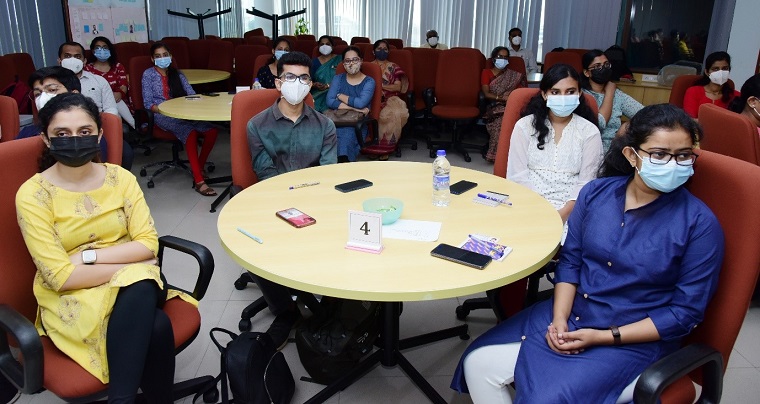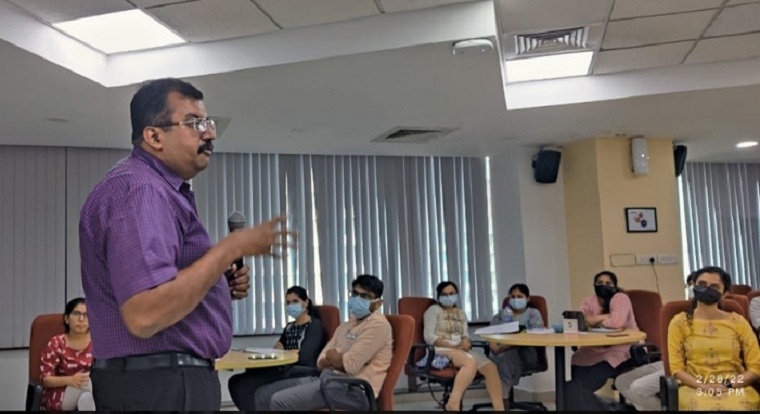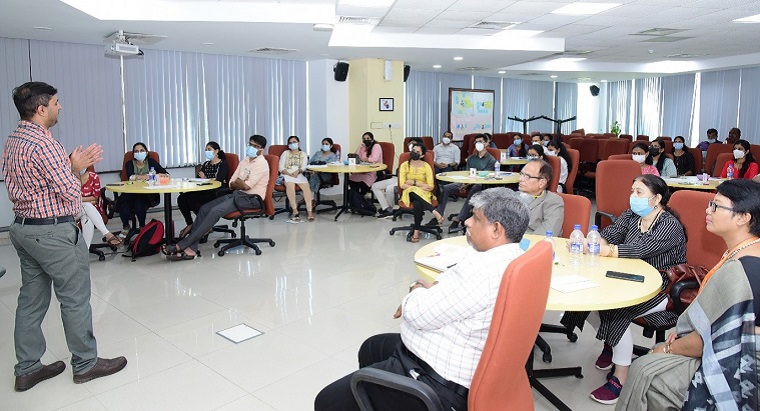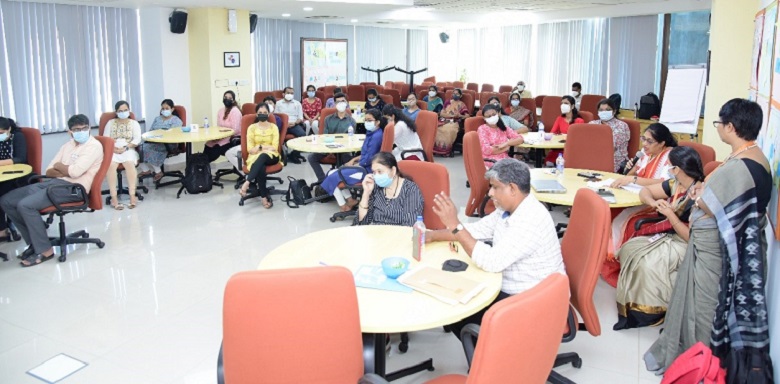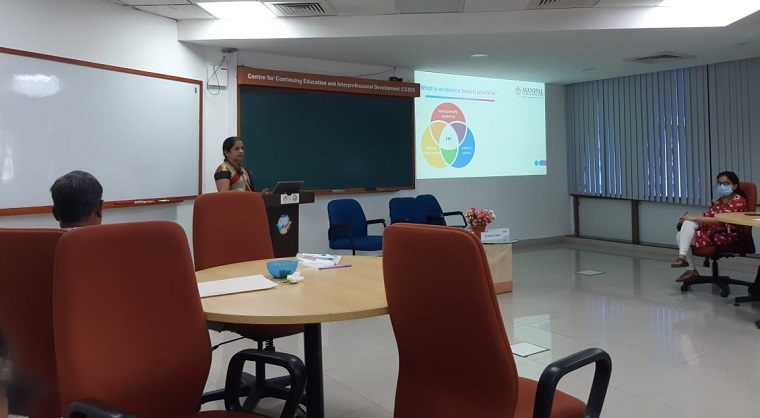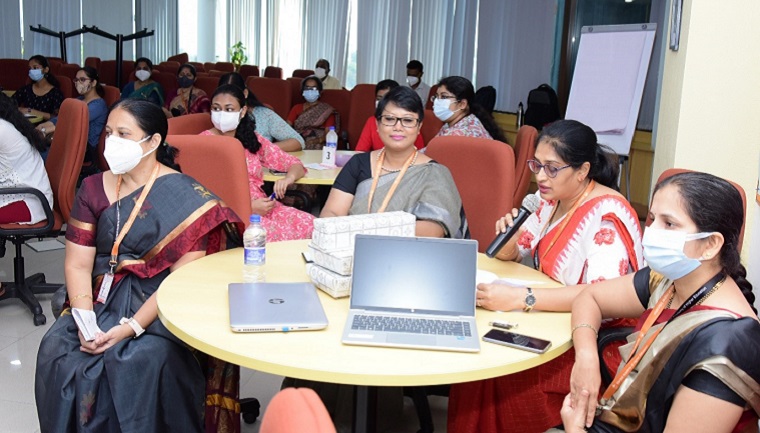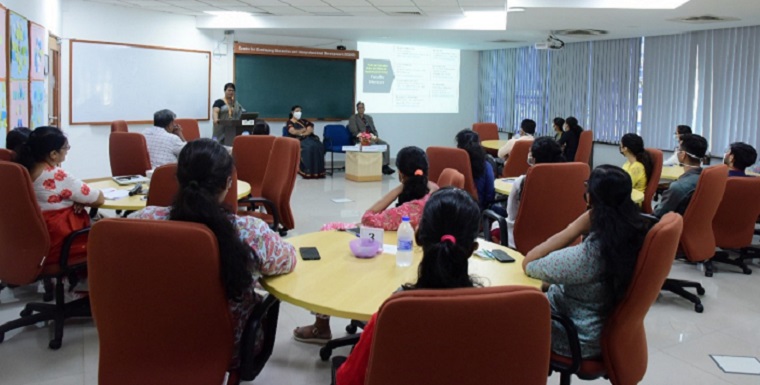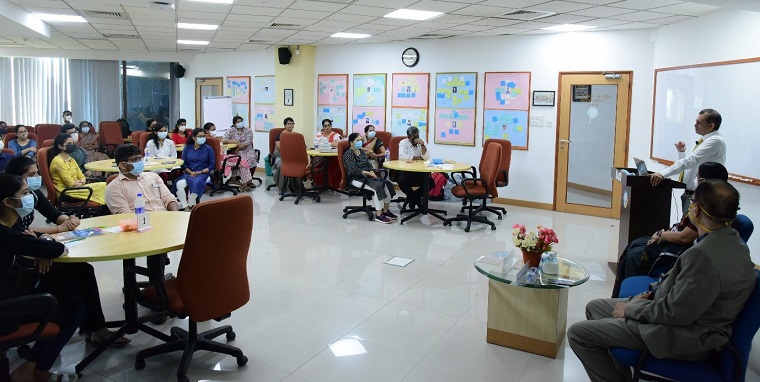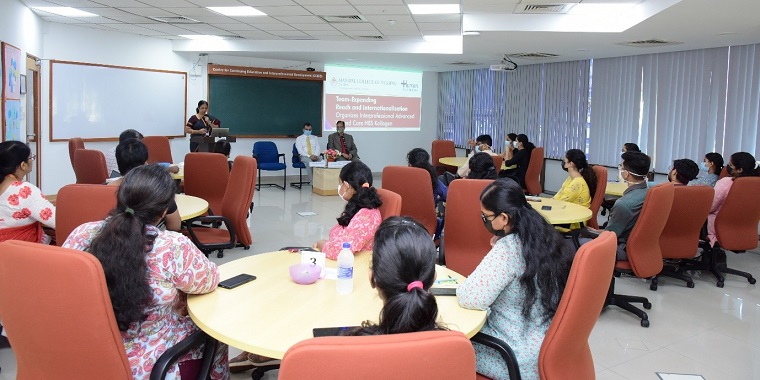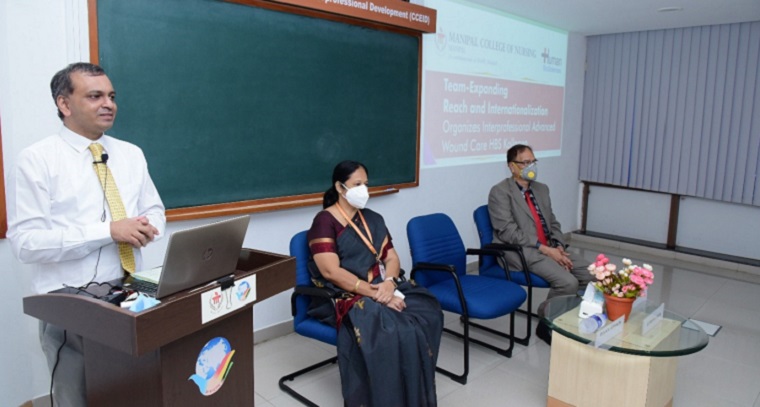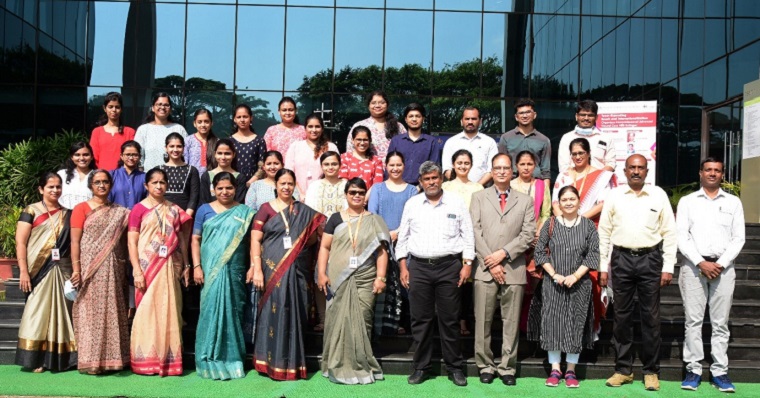Interprofessional Advanced wound care - HBS Kollagen workshop for Medical and Nursing interns
The one-day workshop on Interprofessional Advanced Wound care - HBS Kollagen was conducted on 28th Feb 2022 as a sign of the Interprofessional journey towards wound care sponsored by HBS Collagen India which was attended by MSSB & Nursing interns. A total of nine MBBS interns and 10 nursing interns along with one research staff of KMC attended. The workshop was graced by Dr Naveen S Salins, Professor & Head Palliative Medicine and Supportive care, KMC, MAHE Manipal as the chief guest. He emphasized on health professionals’ awareness and skills towards varying wounds across the speciality. He said “gone are the days of Betadine, when new approaches that best suits the type of wound has come into the clinical practice. Treating the right wound with the right material with a holistic approach to suit every patient's needs is a mandated protocol of practice. He appreciated his journey of wound care having learnt from experienced nurses in India and in Australia. He welcomed the idea of an interprofessional approach to wound management that can only be the choice in this 1st-century clinical arena.
The program was attended by Dr Anice George, former Dean and head of research and Collaboration, Dr Tessy Treesa Jose Associate Dean, MCON, Dr Jyothi Chakrabarty, Professor & HOD, Medical-Surgical Nursing department MCON, MAHE, Manipal
Dr Judith A Noronha, Dean MCON, MAHE Manipal addressed the august gathering with a note of how important is to have a competency-based approach to wound care. She firmly assured her support towards the Manipal HEAL Academy activities to train graduates of both the institute that is MCON & KMC graduates over the years and bring forth research outputs from all these activities and closely work in a team.
Mr Satyendra Bhat, Vice President HBS Kollagen the guest of honour for the workshop was impressed with the response of the medical and nursing team that took a leap into this specialized area where skills are a mandate for MBBS and Nursing graduates. He promised a positive journey towards wound care and supporting future training and research in a bigger picture in collaboration with MAHE Manipal.
Dr Elsa Sanatombi Devi, Professor & Convener and the Coordinator of the Manipal HEAL Academy Wound care center presented glimpses of the academy and also the future expectations from the collaboration. Some of the highlights are-
- Training facilities @MCON & CCEID
- Training 250 MBBS & 100 Nursing interns /year
- Pocket practice sites at Kasturba Hospital- IP team supervised practice). Opportunities of practicing at Surgery OPD/ Orthopedic OPD/ Plastic Surgery OPD/ Oncology OPD/ Critical Care units / OBG OPD/ Community wound care (RMCW centers)
- Development of Protocols & Standards
- Funding from HBS-India & USA/Coloplast/other Funding agencies
- IP UG/PG project collaboration
- PhD scholars – Research & Publication (International collaborations)
- Post-Doctoral fellow invitation for advanced wound care incorporating Artificial Intelligence (AI)
- Induction of AI into wound assessment & Management by graduates
- Yearly international conference/workshops to be conducted with students’-initiated workshops and showcase students’ research activities.
The first session on IP Advanced Wound care: Evidence-based practice was deliberated by Mrs Shalini, Asst. Professor, MCON, MAHE Manipal and Dr Elsa Sanatombi Devi. The highlights were on the use of standard protocols and procedures as per guidelines and work hand in hand with the IP team to provide holistic care to patients and manage wound effectively. Highlights of evidence-based practice were emphasized to students as they graduate for efficient clinical practice and to enhance positive patient care outcomes.
Dr Joseph Thomas, Associate Professor, Plastic Surgery department KMC, MAHE Manipal deliberated on the topic “Negative Pressure for positive wound outcomes”. He highlighted the various types of wounds and how each one needs a specific type of dressings. He underlined the need for training graduates for specific wound care management hands-on and not just theory.
Dr Raj Bommakanti, Vice President HBS USA addressed the graduates via virtual mode about the kind of Kollagen products for wound management and the employability platform for young graduates. He took virtually to showcase what research facilities and the rigorous process at HBS USA in regard to products that are promising in healing difficult wounds. Mr Selvam Joseph Watts, the N S M HBS India, provided hands-on products and their uses in the kinds of wounds that we manage in our clinical setup. He described the role of Kollagen in wound healing with leading case studies with his two decades of experience.
Dr Ashwath M Acharya, Associate Professor, Orthopedic department KMC, MAHE Manipal a hand surgery specialist addressed the many challenges in wound management. He took the students to another level when he picturized the type of difficult wounds that they have to salvage and bring them back to near normal with all skillful techniques. Live videos of wound debridement and dressings that need skills are emphasized to the young graduates.
Sharing experiences by the students both MBBS and Nursing was guided by Dr Elsa Sanatombi Devi. Dr Vishal Shanbhag, Associate Professor, Critical Care Medicine department KMC, MAHE Manipal shared his genuine experiences of wounds with critically ill patients. He explained the many facets of wound healing factors that make the recovery of the patient. He represented his concern for critically ill patients and the need for a holistic approach to wound care with concern and empathy that can make patients feel comfortable and most healing.
Dr Prakash Peralam Yegneswaran, Associate Professor, Department of Microbiology drove the students towards the role of microorganisms and their impact on wound healing and recovery. He ignited the importance of patients’ clinical environment and also correct practice in terms of sample collection, diagnosis and management of medication which needs authenticity. He took the group by storm to see that microbial biodiversity was to be considered during teaching and practice and active group discussion and mapping organisms were initiated using a whiteboard. Students felt the need for relearning the emphasis laid.
Dr Elsa Sanatombi Devi, Dr Sushmitha Karkada, Mrs Shalini G Nayak and Mrs Janet Alva formed groups into medical graduates and Nursing graduates to obtain their experiences. Summaries of these activities will be a recommendation for future practice curriculum plans across medical and nursing training for wounds.
